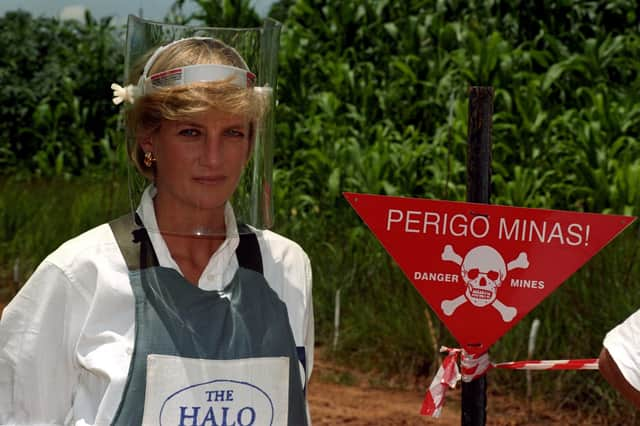How Princess Diana's Angola trip was viewed as a success despite Queen 'stand-off'


The princess provoked international debate when she walked alongside minefields in Angola in January 1997, meeting casualties of the country's 20-year civil war, in a British Red Cross campaign that ultimately led to the United Nations banning their use less than 12 months later, following Diana's death in a car crash.
Images from the visit were beamed around the world, but caused a stir in sections of the British press which sought to pitch Diana's crusade against the Queen - with the princess appearing to support Labour's position on a global ban, while the Conservative government at the time wanted to wait for all countries to signal their intent before signing an accord.
Advertisement
Hide AdAdvertisement
Hide AdPreviously classified documents released by the National Archives in Kew lift a lid on the January's visit, and describe how Diana referred to British press coverage of a perceived stand-off between her and the Queen as a "distraction".
Roger Hart, the British Ambassador to Angola, wrote in a dispatch home to the Foreign Office: "The furore in the British press over perceived differences between the Red Cross' view on a land mine ban and the government's had little local impact on the visit. It was not carried by the Angolan media.
"The princess herself described it as an unnecessary 'distraction', and (British Red Cross director-general Mike) Whitlam as 'a bit of mischief'."
He said the Angolan authorities were "delighted that the princess made the visit, possibly the first ever to their country by a member of our royal family".
“At a critical time in the peace process, it put their country back on the international map and drew worldwide attention to the evils of mines and the tremendous human suffering that they cause," he said.
"The British Red Cross were pleased and so too was the Princess of Wales herself.
"It was the first overseas trip that she has undertaken since agreeing to support the mine ban and was talking about following it up with visits to other heavily mined countries such as Vietnam, Cambodia and Kuwait."
In an interview at the time, Diana already signalled her intentions of a possible global tour promoting her campaign.
Advertisement
Hide AdAdvertisement
Hide AdAsked if that would include Cambodia, Bosnia and Afghanistan, the Princess replied: "Yes, these are the ones most affected - yes, I hope very much to be able to go in there as a British Red Cross volunteer - if they'll have me."
The National Archives documents also reveal Mr Hart informed the Foreign Office that one well-known journalist in particular made her presence felt during the visit.
"I was door-stepped by the pushy BBC court correspondent Jennie Bond," Mr Hart wrote, "and had no option but to say a few off-the-cuff words."
Diana's youngest son, Harry, the Duke of Sussex, made an emotional pilgrimage to Africa last year to retrace the steps of his mother, acknowledging her work to ban landmines.
Comments
Want to join the conversation? Please or to comment on this article.